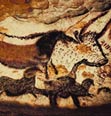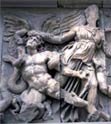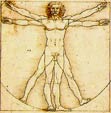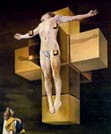From Animism to String Theory: Forever in Search of Eternal Mystery
Tuesday, January 17, 2006 → by Danieru 'String Theory' posits that our universe arises from the vibrations of tiny, infinitesimal and multi-dimensional strings of energy resonating in a higher dimension of reality. A beautiful, if complicated idea resting on the very tip of the physics communities' metaphorical tongue. There is a brief review of Leonard Susskind's new book THE COSMIC LANDSCAPE over at the New York Times website, and this rhetorical passage from it got me thinking:
'String Theory' posits that our universe arises from the vibrations of tiny, infinitesimal and multi-dimensional strings of energy resonating in a higher dimension of reality. A beautiful, if complicated idea resting on the very tip of the physics communities' metaphorical tongue. There is a brief review of Leonard Susskind's new book THE COSMIC LANDSCAPE over at the New York Times website, and this rhetorical passage from it got me thinking:Humans have been around in more or less their present form for about 150,000 years; detailed stories of the origin of the world run as far back as the first written languages and surely existed in oral form much earlier still. How likely is it that this generation, right now, is the lucky one that has discovered the final answer? - link
 A while back I posed a similar question on The Huge Entity which received a lot of welcome response: The next great revolution in reality. Could it be that String Theory, an as yet untestable and devilishly outlandish hypothesis based on purely mathematical assumptions, is set to take mankind into their final era of cosmic understanding? I doubt it. If one assesses human history through the eyes of the natural theory that was prevalent at the time, it becomes obvious that reality perspectives walk hand in hand with cultural evolutions. So much so in fact that is it often hard to see which side affected which the most.
A while back I posed a similar question on The Huge Entity which received a lot of welcome response: The next great revolution in reality. Could it be that String Theory, an as yet untestable and devilishly outlandish hypothesis based on purely mathematical assumptions, is set to take mankind into their final era of cosmic understanding? I doubt it. If one assesses human history through the eyes of the natural theory that was prevalent at the time, it becomes obvious that reality perspectives walk hand in hand with cultural evolutions. So much so in fact that is it often hard to see which side affected which the most.Take Freud's theory of the unconscious for instance. Around the time of his grand human-unveiling both political and artistic aspects of Western society were in tremendous flux.
 The human-being was in the process of being deconstructed, all be it as a half century follow up to another great reality revolution, Darwin's theory of evolution. If we (VERY vaguely) plot the history of human realities a broad sweeping, evolving pattern can be seen emerging from the shifting perspectives. (I will leave it to you to map alongside this pattern the related cultural changes and their depth of symbiosis.) Thus, those 150,000 years of human reality went something like this:
The human-being was in the process of being deconstructed, all be it as a half century follow up to another great reality revolution, Darwin's theory of evolution. If we (VERY vaguely) plot the history of human realities a broad sweeping, evolving pattern can be seen emerging from the shifting perspectives. (I will leave it to you to map alongside this pattern the related cultural changes and their depth of symbiosis.) Thus, those 150,000 years of human reality went something like this:- Animism: Life/nature is governed economically and spiritually by the animals.
- Shamanism/Nature worship:
 Nature is in fact the ruler of all the Earthly mysteries. At the forefront of these are the beasts, including man.
Nature is in fact the ruler of all the Earthly mysteries. At the forefront of these are the beasts, including man. - Polytheism: Multiple Gods each representing a different aspect of existence - accounts for the conflicts seemingly inherent in the natural and human orders - God's are placed at centre of their universe with mankind a mere afterthought.
- Monotheism: One God for all the myriad levels of creation - conflicts are simply signs of humanity's mortality - mankind placed at centre of God's universe & in many senses placed outside of nature.
- Copernicus' heliocentric solar system & Newton's clockwork universe: The natural order is in fact entirely well balanced - all conflicts can be understood with enough time - mankind displaced from centre of the universe.
- Darwin's evolved natural order/Naturalism: The enormous breadth and importance of time is at once understood - man is part of nature again.
 Mankind is but one aspect of life's eternal struggle.
Mankind is but one aspect of life's eternal struggle. - Einstein's relative space and time: Clockwork universe shattered - reality as we know it is merely a comfortable illusion, but still accessible.
- Quantum Theory's universe of mere probabilities: Fundamentally reality is outside of human understanding, all things are probable given enough time.
- String Theory's infinity of universes: Our universe is itself displaced - infinity rules (for now).
 on our minute spinning ball of rock, it is the ways in which culture will be altered which should have most relevance to us.
on our minute spinning ball of rock, it is the ways in which culture will be altered which should have most relevance to us.To me the greatest cultural shift that I could hope for would be for String Theory to somehow finally delete God from our world altogether. The naivety of this hope is obvious in that throughout all change, and in spite of any which might yet occur, humanity will always crave meaning beyond themselves, and through that meaning revel in the eternal mysteries of the universe. And since God is still as good a way as any to find that sense of mystery I ask you, have we really changed that much?
Categories: Science, History, News, Reality, Links, Art, Culture, Human, Evolution, Physics, Religion, God, Consciousness, Books, Future, Nature, Ideas, Nonsense?
|
|

 Links
Links Subscribe via RSS!
Subscribe via RSS!


 Via Email
Via Email


Why do we spend our waking hours attempting to delete something that we cannot comprehend and therefore, rightly disbelieve? I'm thinking that the time has come to say enough is enough. Maybe, just maybe, the so-called pinnacles of human metaphysical understanding you outline above need to be combined into one monolithic cloud of uncertainty that has always begged the very question you ask: Have we really changed that much?
I think no, we have not changed at all. I think the human mind contains within it the capacity for change, but it is only as we "come of age" that we can attain a definitive approximation of this "age" and what it means. Humans perhaps must face their extinction first and then from that shall the rest come. It isn't purely science which derived the conventional universe around us, but the combined like capacities of all humans throughout our common lineages to think both critically and spiritually.
Global consciousness is learning. It must or it will die. From the whole comes the part, we must preserve the sovereignty of its parts if we are to remain human in the face of the whole. We cannot delete god, I do not think any sooner than we can delete ourselves. And in a sense, it occurs to me, that this is a kind of backassward proof of the exisence of some sort of entity. There perhaps is nothing we can ever know for sure, but must remain content to speculate on.
January 18, 2006 6:55 AM
Science will never finally solve all the mysteries of reality, but it can take our perceptions to clearer realms of understanding. The concept of 'God' for me lies several hundred millenia hence in human history; in human understanding; in human (perceptual) evolution. I guess I was begging the question...
What is there yet to come which might not replace God, but displace the idea of it from our grand reality perceptions?
The pessimist in me fears that God, in one form or another, is set to be with us for a long time yet. How about you?
January 18, 2006 1:23 PM
It seems antithetical to the very notion of God and faith for science guys like JK to expect 'tangible proof of life.'
Anybody read Randall's Hidden Dimensions or this book by Feynmann?
January 18, 2006 6:17 PM
i go through phases on my opinions of whether faith and science can compliment each other. on the one hand most beliefs based on religious faith make absolutely no sense when placed under the spotlight of scientific, and more specifically logical, enquiry. and yet reality is but a construct of the mind, why not envelope yourself in a religious reality?
the hopes and dreams one can have seem just as real, and the contentedness that can be uncovered from religion often seems to dwarf that the average person on the street can gain from science.
still, religion for me is a window onto the human construct. belief, faith, myth, morality and the sense of an all eternal prescence in the universe all fascinate me with or without religion. when i apply a scientific mind to religion i definitely understand humans better, and thus myself in this reality. i just don't think that this understanding comes from anywhere near the same place that a person of faith observing science would attain theirs.
our worlds are intractably incompatiable
January 19, 2006 1:10 PM
If you like the skeptics view, you can't go wrong with their little hokey-kokey. Put your left leg in, take your left leg out. In-out, in-out, you shake it all about...
January 20, 2006 6:31 AM
These are only functional limitations. But they enter into the whole picture anyway.
I'm willing to maintain some faith in the possibility that it is because of this that God must exist - because there must be something consistent and immutable behind all this, or it would not have the coherence to continue. I don't want to say the definition of God is "That which is the only limit on anything and everything." Rather, when all else is explained away and understood, God would have to be the non-physical reason, intention or motivation for the whole thing to exist at all. If there are 'strings', and if they vibrate, and if it is because they must - why must they?
April 28, 2008 5:07 AM
Post a Comment